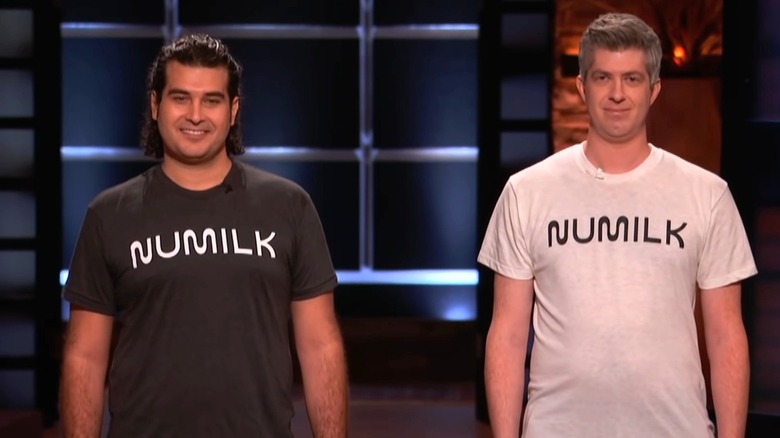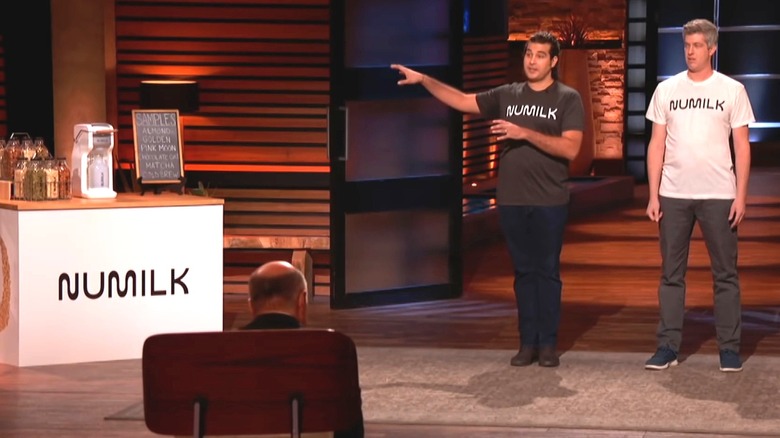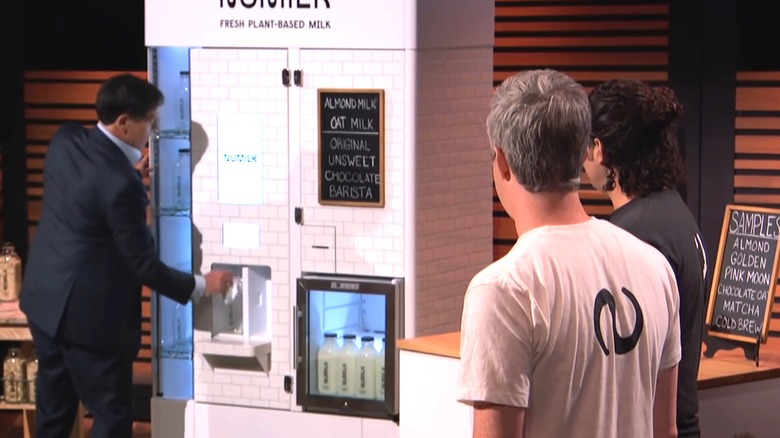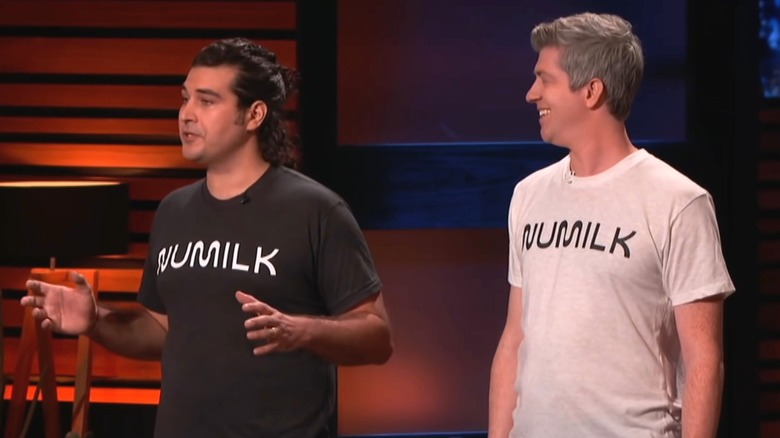Whatever Happened To Numilk After Shark Tank?
Many people are making the switch from cow's milk to plant-based dairy products thanks to their many health benefits. In response to this growing trend, entrepreneurs Joe Savino and Ari Tolwin created Numilk, offering a new form of convenience for such consumers. The company produces a line of machines that make almond milk on demand. Customers can grab a reusable bottle, select their variety of milk from the machine, and have their drink made in almost no time. Their milk only contains a handful of ingredients, ensuring that their product is more pure and healthy than that of competitors.
Inspired by a similar product at Whole Foods that allowed customers to grind their own peanut butter, co-founder Ari Tolwin got to thinking about how to apply it to creating almond milk. "We could make plant-based milk that could be better for the environment and more delicious," Tolwin said in an interview with The Detroit Jewish News. "And we could do it in a way that was differentiated [by in-store shopping] to allow people to make fresh plant-based milks on location." With that concept, he and Savino started their company in 2018. Both individuals have backgrounds in food and beverage services, with Savino originally working in aviation catering and co-packing, while Tolwin once ran a maple water company that had nationwide distribution.
While they saw some success after launching in a New Jersey Whole Foods location, the duo was facing a set of problems that made it difficult to scale the business. Did "Shark Tank" provide a solution?
Numilk made a massive deal with Mark Cuban
The Numilk team came on to "Shark Tank" Season 12 with a hefty ask — $1 million for a 5% stake in their business. After giving their initial pitch, the duo allowed Mark Cuban to try out the machine. The sharks loved the product, commenting on its freshness compared to store brands.
The conversation then transitioned to their business structure. The kiosks bring in about $50,000 a year, and they hoped to bring production costs down from $30,000 to $15,000 once they scaled up. They then revealed their new development — a counter top version of their machines. Currently, they only had a 3D rendered prototype and a handful were being used in coffee shops, but all the sharks saw its potential.
At the time of the pitch, they had accumulated losses of $7 million, in large part due to R&D costs along with the COVID-19 pandemic halting some of their retail deals. Barbara Corcoran, Daymond John, and Lori Grenier all went out, stating that they were confused by the pitch. Kevin O'Leary was willing to give the $1 million as a loan at 9.5% interest for three years alongside the 5% equity stake. In an interesting move, Cuban made a partial loan deal of his own; believing that they'll need more for marketing and inventory, he offered $1 million as an investment at 7% equity and another $1 million as an optional loan at 3% interest with an additional 3% stake. In total, if they used the loan, the deal came out to $2 million for 10%, which they accepted. So, was Mark Cuban what the team needed to solve their problems?
Numilk after Shark Tank
The sharks may have had a high opinion of what Numilk could offer, but "Shark Tank" viewers weren't as enticed. On X (formerly known as Twitter), user @caitlinbrooks pointed out, "Do people not know you can make your own oat milk with a blender?" Meanwhile, @blackstar_pi didn't believe that the business model would hold up well, commenting, "Seems too complicated and they loose money like crazy." Nevertheless, reactions like these did little to halt the Numilk entrepreneurs' immediate progress.
Shortly after their episode aired, the Numilk team shifted their focus, launching a new Kickstarter campaign in an effort to fund production on their countertop product, the Numilk Home. They managed to bring in over $222,000 from 888 backers, more than doubling the target of $100,000. Soon after, they announced that they would be removing their kiosk machines from grocery stores, hoping to focus on their Numilk Home and Pro lines.
It's likely that, given their past financial issues, the immense costs of producing and maintaining these store machines could no longer be justified. But while they closed the door on larger chains, the team planned to extend their partnerships with smaller grocery stores and cafes, with Ari Tolwin hoping to find locations in his hometown of Michigan. Despite these steps, some of Numilk's past issues seemed to catch up with them yet again, ultimately putting a damper on some of these ambitions.
Is Numilk still in business?
While Numilk is still in business today, there hasn't been much movement for the company since their time on "Shark Tank." If you're looking to add a Numilk Home to your kitchen, you'll be disappointed. Currently, customers are being added to a growing waitlist for the product, which has left many Kickstarter contributors upset. The campaign stated that delivery would take place between August 2021 and 2022. However, comments as recent as August 2023 complain that they've yet to receive their item or even a response from the company.
Hope may be in sight for Numilk, though. In March 2023, they reached an agreement with Hamilton Beach to produce and sell their products. "Hamilton Beach Brands has an outstanding reputation for creating high-quality, durable, and innovative small appliances," Ari Tolwin said in a press release. "Their design capabilities, manufacturing relationships, selling and distribution expertise across all retail and commercial channels will enable us to rapidly scale." The parties are currently developing a new line of products, with plans to launch in 2024.
For the time being, customers can purchase Numilk's milk pouches and reusable bottles on their website, where they sell almond, pistachio, cashew, oat, and matcha latte options. Sadly, due to the continued delays on the machines, they are expected to lose more money this year. But these setbacks haven't stopped Numilk's vision for the future.
What's next for Numilk?
Numilk's case is pretty unusual compared to most "Shark Tank" companies. Mark Cuban's $2 million investment was one of the series' biggest and should have ensured rapid growth for the business. It appears that their deal did close, as Numilk is featured on Cuban's website, but the company seems to still be facing some age-old dilemmas. It is possible that the deal was altered afterwards, leaving Cuban with a smaller piece of the pie, but it's hard to tell. In the end, the confusion seems to come down to the founders making a sudden pivot in their business model.
The grocery store kiosks likely ate up a lot of investment money, and it seems that they were the company's only consistent source of revenue. It also appears there wasn't much of a plan in place when switching the focus to the home appliance division, particularly with regard to what it would take for manufacturing to get up and running. Nevertheless, the demand is still there, and the team is well aware of the potential Numilk has for the future. Speaking with The Detroit Jewish News, Ari Tolwin stated his confidence in what Numilk is capable of, saying, "We absolutely will scale internationally. We're uniquely suited to it." With their ambition, Cuban's help, and their new deal with Hamilton Beach, Numilk may have a bright future after all.



